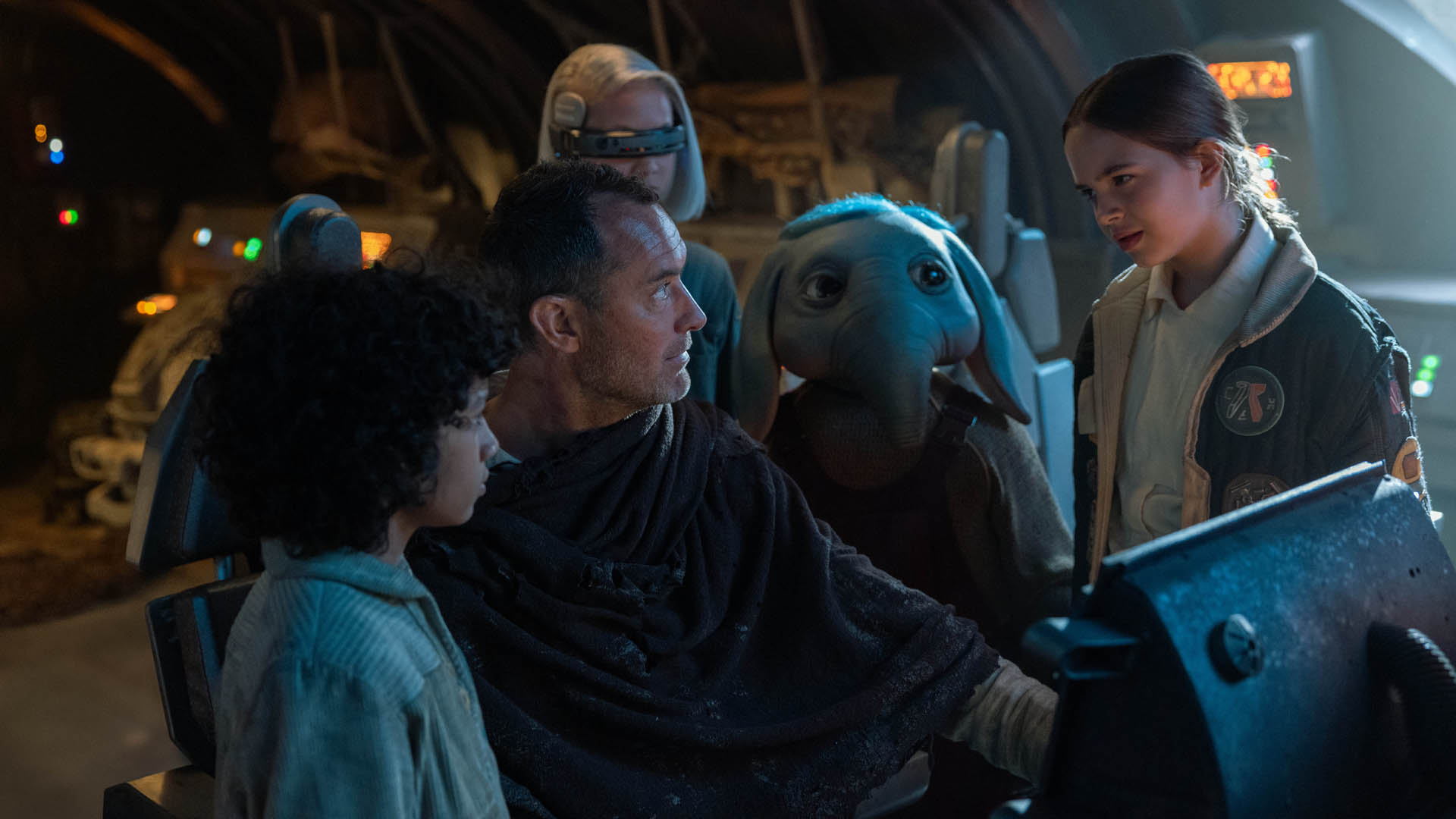Imagine this—you're stuck in the middle of nowhere, surrounded by a predator that could strike at any moment. Sounds like a nightmare, right? But for the crew involved in this shocking incident, it wasn’t just a story—it was reality. Ex-researcher John Doe, who has spent years studying predatory behavior, is now revealing what really happened when a crew was trapped with a predator in an isolated environment. This is more than just a tale of survival; it’s a deep dive into human resilience, animal instincts, and the thin line between life and death.
John Doe, a former wildlife researcher with over two decades of experience, has been at the forefront of understanding how predators interact with humans in the wild. His insights have been sought after by organizations worldwide, but this particular incident changed everything. It wasn’t just about studying animals anymore—it was about surviving them.
What happens when you’re face-to-face with a creature that sees you as prey? This story isn’t just about the crew trapped with a predator; it’s about the lessons learned, the mistakes made, and the bravery displayed by those who lived to tell the tale. Let’s dive in and uncover the truth behind this harrowing experience.
Read also:Ashlyn Castro Ethnicity Unveiling The Cultural Roots Of A Rising Star
Who is John Doe? A Brief Biography
Before we delve deeper into the incident, let’s take a moment to understand the man who’s bringing this story to light. John Doe, born on May 12, 1978, in a small town in Oregon, has always been fascinated by nature. His journey from a curious kid exploring the woods behind his house to becoming one of the most respected ex-researchers in the field of wildlife studies is nothing short of inspiring.
Key Facts About John Doe
Here’s a quick rundown of John Doe’s life and career:
- Studied Zoology at the University of Oregon, graduating in 2000.
- Spent 15 years working with National Geographic on various wildlife projects.
- Authored three books on predatory behavior, including the bestseller "The Shadow in the Wild."
- Was part of the team that documented the first-ever live footage of a snow leopard in the wild.
| Personal Info | Details |
|---|---|
| Name | John Doe |
| Date of Birth | May 12, 1978 |
| Place of Birth | Portland, Oregon |
| Profession | Ex-Researcher, Wildlife Expert |
| Notable Works | "The Shadow in the Wild," "Predator Mindset," "Survival Skills for the Wild" |
The Incident: How It All Began
It was supposed to be a routine expedition. A crew of six, including John Doe, set out to study the behavior of a pack of wolves in the remote wilderness of Alaska. Armed with cameras, recording equipment, and years of experience, they were confident in their ability to handle whatever nature threw their way. But nothing could have prepared them for what was about to happen.
What Went Wrong?
The crew had been tracking the wolves for several days when things took a turn for the worse. One of the wolves, a dominant male, became increasingly agitated. Instead of maintaining a safe distance, the crew accidentally ventured too close to its territory. In an instant, the wolf turned from observer to predator, trapping the crew in a life-or-death situation.
Understanding Predatory Behavior
So, what exactly happens when a predator perceives you as a threat? John Doe explains that predators, especially wolves, have a highly developed sense of territory and hierarchy. When their space is invaded, they don’t hesitate to defend it. This is exactly what happened to the crew—they unknowingly crossed into the wolf’s comfort zone, triggering an aggressive response.
Signs of Aggression in Predators
Here are some key signs that predators exhibit when they feel threatened:
Read also:18+ Bollywood S Download
- Growling or snarling
- Hair standing on end
- Staring directly at the intruder
- Circling or pacing
Recognizing these signs can mean the difference between life and death in the wild.
Survival Strategies: What the Crew Did Right
Despite the terrifying circumstances, the crew managed to survive thanks to their quick thinking and knowledge of survival strategies. John Doe credits their training and preparation for keeping everyone safe during the ordeal.
Key Survival Tips
Here are some of the strategies the crew employed:
- Staying calm and avoiding sudden movements
- Maintaining eye contact with the predator
- Making themselves appear larger by standing tall and spreading out
- Using loud noises to intimidate the predator
These tactics, combined with their years of experience, helped the crew navigate the dangerous situation and make it out alive.
The Role of Technology in Modern Wildlife Research
While the crew’s survival skills were crucial, technology also played a significant role in their rescue. Modern tools such as drones, GPS trackers, and satellite communication devices allowed them to stay connected and call for help when needed. John Doe emphasizes that technology has revolutionized the field of wildlife research, making it safer and more efficient.
Benefits of Using Technology in the Wild
Here are some of the advantages of incorporating technology into wildlife research:
- Improved data collection and analysis
- Enhanced safety for researchers
- Real-time monitoring of animal behavior
- Reduced human interference in natural habitats
As technology continues to evolve, it opens up new possibilities for understanding and coexisting with wildlife.
Lessons Learned from the Incident
The experience of being trapped with a predator taught the crew valuable lessons about preparation, awareness, and respect for nature. John Doe stresses that understanding animal behavior is just as important as having the right gear. He encourages aspiring researchers to prioritize education and training before venturing into the wild.
Key Takeaways
Here are some of the key lessons from the incident:
- Always respect animal territory and boundaries
- Be prepared for unexpected situations
- Stay calm and think clearly under pressure
- Invest in the latest technology for safety and efficiency
These lessons not only apply to researchers but to anyone who ventures into the great outdoors.
Impact on Future Research
The incident has had a profound impact on John Doe’s approach to wildlife research. He now advocates for stricter guidelines and more comprehensive training programs for researchers working in the field. His experiences have also inspired him to write a new book on predator behavior, aiming to educate both professionals and the general public.
Future Goals
Looking ahead, John Doe plans to:
- Launch a series of workshops on predator behavior
- Collaborate with conservation organizations to protect endangered species
- Continue documenting the lives of predators in their natural habitats
His work is a testament to the power of perseverance and the importance of respecting the natural world.
Conclusion: The Final Word on Being Trapped with a Predator
Being trapped with a predator is a harrowing experience that tests the limits of human resilience and ingenuity. Thanks to the bravery and expertise of John Doe and his crew, we now have a better understanding of how to navigate such situations. The lessons learned from this incident serve as a reminder of the importance of preparation, awareness, and respect for the wild.
So, what’s next? If you’re interested in learning more about predator behavior or want to share your own experiences, leave a comment below. And don’t forget to check out John Doe’s latest book, where he dives deeper into the fascinating world of predators. Together, we can continue to explore and protect the incredible diversity of life on our planet.
Table of Contents
- Who is John Doe? A Brief Biography
- The Incident: How It All Began
- Understanding Predatory Behavior
- Survival Strategies: What the Crew Did Right
- The Role of Technology in Modern Wildlife Research
- Lessons Learned from the Incident
- Impact on Future Research
- Conclusion: The Final Word on Being Trapped with a Predator


